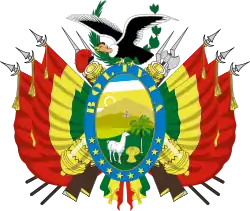 |
|---|
|
|
A vote of confidence in President Evo Morales in the form of a referendum was held in Bolivia on 10 August 2008.[1] The vote was held to determine whether Morales, Vice President Álvaro García Linera, and eight out of nine departmental Prefects should stay in office.[2] Morales received more than 67% support and six of the eight prefects were returned. The prefects of Cochabamba Department and La Paz Department were defeated and had to face re-election.
Background
The referendum was initially suggested by Morales in December 2007, but was rejected by the opposition at the time. However, the opposition-controlled Senate brought back the suggestion following their victory in the Santa Cruz autonomy referendum on 4 May 2008, with Morales agreeing to hold the vote.
The recall election would be deemed successful if the percentage voting in favour of the recall exceeded the percentage of voters that originally voted for the person. For Morales and Linera, there would have to be more than 53.74% (their margin in the 2005 presidential election). The same rules apply for the governors, but their margins are between 48% and 38% in La Paz Department which makes their recall much easier to accomplish.[2][3] If the recall is successful then fresh elections would be held.[4] Morales has stated that if he stays in office, he will use the referendum result as a springboard for more reforms – for instance, setting a date for the constitutional referendum which would grant more rights to Bolivia's poor indigenous population.[5] If he loses, he said he would go back to farming coca.[2]
Polls in May 2008 showed Morales easily defeating the recall.[6]
Following autonomy referendums held in the second quarter of 2008 in Santa Cruz, Beni, Pando and Tarija, the governors of these four states initially refused to take part in the recall referendum unless the referendum complied with the new autonomy statutes, which the Supreme Electoral Court considers to be invalid; they pushed for early elections to be held instead.[7] Nonetheless, the governors later agreed to participate.[8] However, there were still obstructive measures from these four departments a few days before the referendum.[9]
The recall referendum did not apply to the governor of Chuquisaca Department, as Savina Cuéllar was just elected very recently in June 2008.[10] Cuéllar was a member of the Bolivian Constituent Assembly for Morales' Movement for Socialism, but ran for governorship of Chuquisaca as the candidate of the opposition Interinstitutional Committee Alliance, winning with 55% to MAS' Wálter Valda's 45%.[11] The gubernatorial election was held after the previous governor, David Sánchez of MAS, resigned (against the wish of his party) due to violent protests.
Shortly before the election, the rules were changed, though the legality of this move remains in doubt; under the new rules, the governors will be removed from office if over 50% of voters recall them, effectively raising the threshold required.[12]
Results
| Position | Party | Candidate | Votes against recall | % against recall | % threshold | Result |
|---|---|---|---|---|---|---|
| President Vice President | Movement Toward Socialism | Juan Evo Morales Ayma Álvaro García Linera |
2,103,732 | 67.41% | 53.7% | Survived |
| Prefect of Beni Department | PODEMOS | Ernesto Suárez | 64,866 | 64.25% | 44.64% | Survived |
| Prefect of Chuquisaca Department | Allianza Comité Interinstitucional | Savina Cuéllar | Not voting | |||
| Prefect of Cochabamba Department | Nueva Fuerza Republicana | Manfred Reyes Villa | 195,290 | 35.19% | 47.64% | Recalled |
| Prefect of La Paz Department | José Luis Paredes | 362,214 | 35.48% | 37.99% | Recalled | |
| Prefect of Oruro Department | Alberto Luis Aguilar | 84,364 | 50.86% | 40.95% | Survived | |
| Prefect of Pando Department | PODEMOS | Leopoldo Fernández | 14,841 | 56.21% | 48.03% | Survived |
| Prefect of Potosí Department | Mario Virreira | 171,629 | 79.08% | 40.69% | Survived | |
| Prefect of Santa Cruz Department | Autonomy for Bolivia | Ruben Costas | 451,191 | 66.43% | 47.87% | Survived |
| Prefect of Tarija Department | Civic Committee | Mario Cossío | 78,170 | 58.06% | 45.65% | Survived |
| Source: National Election Court of Bolivia | ||||||
References
- ↑ "Morales 'wins' Bolivia referendum", Al Jazeera, August 11, 2008.
- 1 2 3 Simon Gardner, "Morales seen winning Bolivia vote, reforms in air", Reuters (The Washington Post), August 7, 2008 (accessed August 7, 2008).
- ↑ "Morales setzt Referendum über seine Amtsführung an", NZZ Online, May 13, 2008.
- ↑ "Bolivians to hold confidence vote", BBC News, May 9, 2008.
- ↑ "Morales 'set on Bolivia reforms'", BBC News, May 15, 2008
- ↑ "Morales Would Defeat Opponents Again in Bolivia", Angus Reid Global Monitor, May 28, 2008.
- ↑ "Governors snub Bolivia referendum", BBC News, June 24, 2008.
- ↑ "Bolivia's opposition governors agree to recall vote", Associated Press (International Herald Tribune), July 5, 2008.
- ↑ "Maneuvers to Block Referendum Soars in Bolivia" Archived March 15, 2009, at the Wayback Machine, Prensa Latina, July 31, 2008.
- ↑ "Pronto*". Archived from the original on 2008-11-18. Retrieved 2008-07-09.
- ↑ Upside Down World - Politics in Bolivia: Volatile Loyalties, Deep Divisions
- ↑ James Painter, "Divided Bolivia set for referendum", BBC News, August 9, 2008.
.jpg.webp)